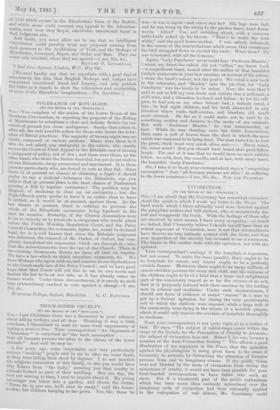TOLERANCE OF RITUALISM. [To THE EDITOR OP THE "SPECTATOR.") SIR,—You
complain of the action of the Lower House of the Northern Convocation, in rejecting the proposal of the Bishop of Manchester to substitute a clear and definite Rubric for one
which at present you deem ambiguous. Surely that action is, after all, the only possible action for those who desire the toler- ation of Ritual practices. The majority of twenty-eight was, no doubt, composed of various sections. There were those in it who do not admit any ambiguity in the rubric, who openly accuse the Court of Final Appeal in the Ridsdale case of issuing
a judgment of policy, not of law ; and there were those, on the other hand, who think the Rubric doubtful, but yet do not wish to see the Ritualistic clergy prosecuted and imprisoned. It is these persons particularly who are forced to vote as they did. Since there is at present no chance of obtaining a legal—I should prefer to say a judicial—tolerance for Ritualists, can you believe that at present there is the least chance of Parliament passing a Bill to legalise vestments ? The position may be Illogical, of declining to clear up an ambiguity ; but the High-Church party prefer to have it so, rather than to have it settled, as it would be at present, against them. As the law stands at present, there is nothing to prevent the whole of the Ritualistic ceremonies being legalised in the next six months. Probably, if the Church Association were to be so unlucky as to prosecute a clergyman who would plead before the Public Worship Regulation Court, and the Privy Council Committee, the vestments, lights, &c., would be declared legal, for it is well known that since the Ridsdale judgment was delivered, the research of Mr. Parker, of Oxford, has com- pletely demolished the arguments which ran through it,—viz., that the Advertisements were the law of the Church. Thus, in the existing Ornaments Rubric we have all that we require. We have a law which we think sanctions vestments, S6c. We have Bishops who agree with us, and connive at our disobedience to the Court-made law of the Privy Council; and we have good hope that that Court will yet live to eat its own words and declare the law to be on our side, as it has already eaten its former words. Under these circumstances, it is surely no such very extraordinary conduct to vote against a change.—I am, Sir, &c.
Brasenose College, Oxford, .MarelOtli. G. C. FLETCHER.






































 Previous page
Previous page